The current state of DRS implementation among European countries can be divided mainly based on three factors: countries with DRS already implemented, countries that have adopted the legislation already, and countries with ongoing discussions about DRS implementation.
In the table below, you can find the overview of the current status of DRS in European countries, as well as the recycling rate of plastic beverage packaging among countries that already have a functioning DRS. Below the table, you can find a short description and interesting facts about the DRS status in some of the countries.
Last-updated date 23/11/2023

Belgium
Belgium was long perceived as the only EU member claiming there was no need to implement a Deposit Refund System (DRS) in the future, as the recycling rates were still considered quite high, even when plastic beverage packaging was collected from homes along with other plastic waste. Currently, there is no official whole-market selective collection rate for plastic bottles, and there are several initiatives, such as Recover—a collaboration between 11 waste inter-municipal companies and the city of Antwerp—indicating that the collection rate of PET bottles might not be as high as assumed. All Belgian regions, namely Flanders, Brussels, and Wallonia, intend to introduce deposits on cans and plastic bottles from 2025 to reduce litter. However, they are divided over whether to adopt the traditional deposit system or an alternative system using an app proposed by the Flemish government, which has sparked considerable controversy and debate. The pros and cons of the digital DRS were thoroughly analyzed in this study by Recycling Netwerk.
Iceland
As mentioned previously in this article, Iceland is the only European country with a return-to-depot DRS model. Even with this model, the Nordic country had very high collection rates in past years – 87% in 2012 and 90% in 2016. The numbers were going down in past years to 85% in 2016 (aluminum appr. 90%, 87% in PET, and 83% in glass) assuming this problem to the increasing amounts of tourists visiting the country and not being familiar with the deposit return system.
Romania
Romania has already adopted the legislation and completed the selection process of the DRS administrator – RetuRO Sistem Garantie Returnare S.A. Currently, the country is about to kick off the registration and contracting phase.
Germany
Germany was the first big European country with a population bigger than 30 million to adopt a deposit refund scheme back in 2003 and it took inspiration from systems in Nordic countries. Germany’s DRS is reaching a very high collection rate and is including a collection of glass, metal, and plastic and the deposit (pfand) for PET bottles is €0.25, which is higher than for the glass bottles (€0.08 and €0.15).
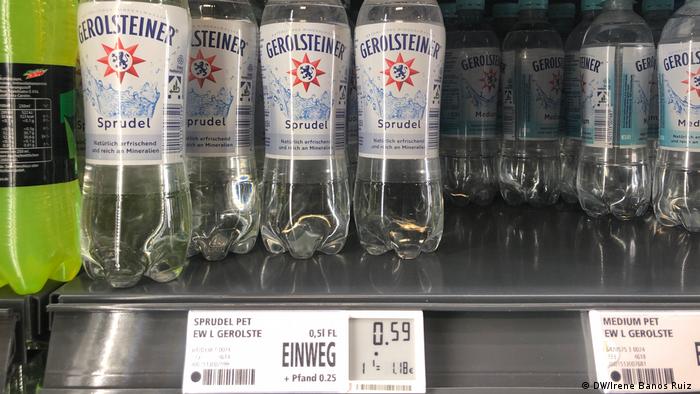
Norway
The DRS in Norway was launched in 1996 following 10 years of discussion, development and testing. PET bottles for beverages and a small amount of HDPE and aluminum cans can be returned at one of the 3.500 reverse vending machines (RVM). 93% of the total drink containers are collected via this stream and 7% are collected manually at one of the 11.500 collection points registered in the system.
Czech Republic
Czech Republic will probably easily manage to reach the first goal of the EU single-use plastic bottles directive (77% collection rate of PET containers until 2025) even without the implementation of DRS. According to a company EKO-KOM, it reaches currently 82% thanks to its dense waste collection network. Nevertheless, the second goal (90% by 2029) can be a problem for the CEE country.
“Discussions need to be held regarding the second goal, but the amount of beverage bottles that need to be collected in addition to the current state is about ten thousand tons. This can be achieved with a whole range of measures,” the Czech Department of the Environment told EURACTIV Slovakia. To name some of them – Ministry is considering a gradual reduction in the production of mixed municipal waste and a thickening of the sorted collection network.
However, according to beverage companies, these solutions will not be enough to achieve European goals. “Voluntary collections have not been successful anywhere in the world, and the Czech Republic will not be an exception,” said Andrea Brožová, spokeswoman for the Zálohujme (Let’s deposit) initiative.
The study shows What We Waste mentioned above in this article showed that the waste of drink containers would rapidly fall with the implementation of the Deposit Refund System also in the Czech Republic – from 93 wasted packaging containers to 22 per citizen per year).

Estonia
The Deposit Return System in Estonia was introduced already in May 2005. Accordingly to the article by rohe geenius relying on the data of the main packaging recycling company Eesti Pandipakend, in 2021 people in Estonia returned 293 million pieces of deposit items (plastic, glass bottles, and metal cans) through the DR system. Among all the packaging for recycling on the market, 88% of plastic items, 89% of metal items, and 87% of glass items were returned by people. From 2005 until the end of 2021, almost 4,6 billion deposit items of packaging were returned. The deposit for each item is 10 euro cents.
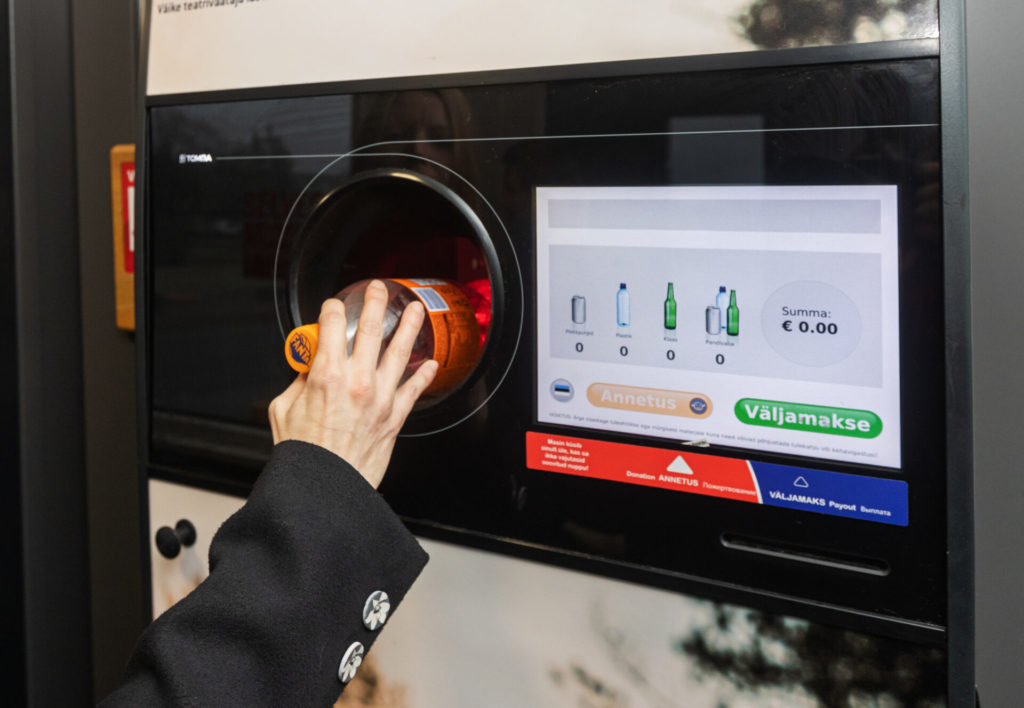
Slovakia
The history of the Slovak deposit return scheme dates back to 2003 when the first public discussion about its implementation started. Since 2019 these efforts became more tangible – the country defined a strategy with a focus on a deposit return scheme for PET bottles and metal and aluminium cans. On January 1st, 2021, the Ministry of Environment established the Deposit Return System Administrator as the managing body of the DRS in Slovakia.
DRS Administrator was created by a consortium of four non-profit professional associations representing producers and retail, that cover 80% of the products in plastic bottles and cans on the Slovak market and approximately 3.200 commercial establishments. Slovakia launched its DRS system on January 1st 2022 as the 11th European country, and it took them only 10 months. DRS IT System integrator in Slovakia is a leading company in smart waste management Sensoneo.
The return rate in the first year of DRS reached 71%, when 820 million beverage containers were collected, out of 1.1 billion containers placed on the market. The return rate during the second year of the DRS in Slovakia is already 93%.

Latvia
The deposit system operator in Latvia is SIA “Depozīta Iepakojuma Operators” in which various beverage companies and associations of beverage companies, as well as food retail companies, are stakeholders. The system was launched on February 1, 2022, and in the first six months of operation, there were 187,7 million items of deposit packaging (plastic and glass bottles, metal cans) in the market, of which 101,5 million items were returned by the consumers. The deposit for each item is 10 euro cents like in Estonia.
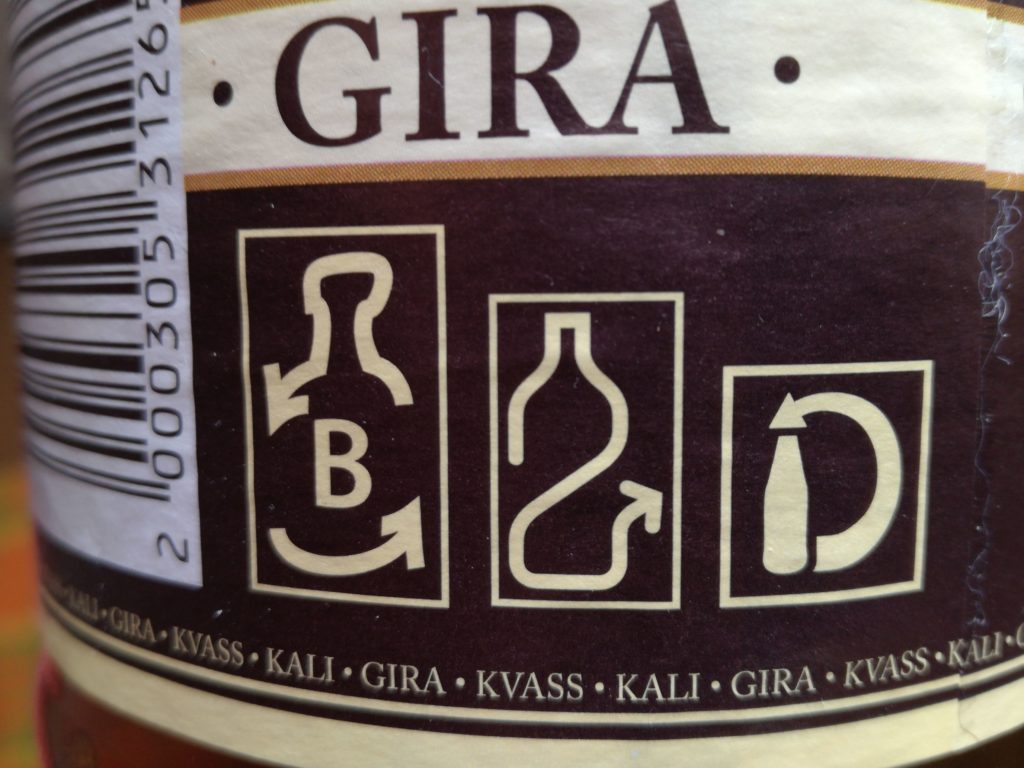
Lithuania
The Deposit Return System in Lithuania was launched in 2016 and it is considered one of the most modern ones in the world. During its first year of implementation, the collection rate of drinks containers reached 70% and succeeded to improve by 20% during the second year to reach a 90% collection rate in 2017. The latest collection rate reached 92% according to UNESDA.
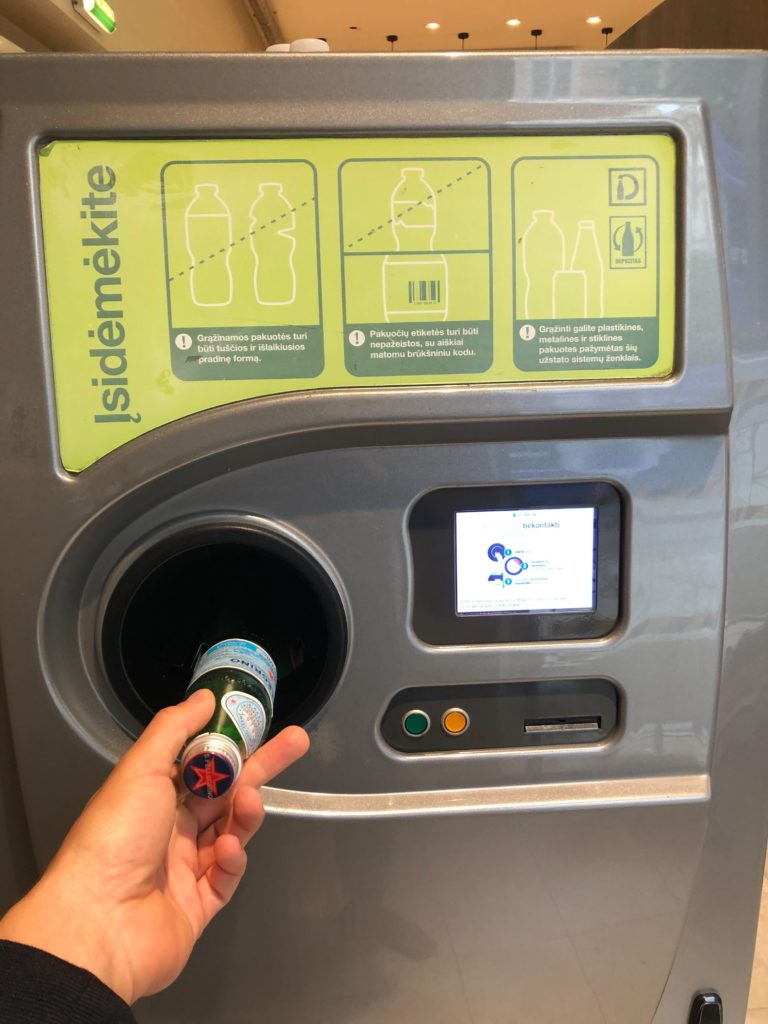
Denmark
The Dansk Retursystem is a non-profit organization that is responsible for all operations related to the Danish deposit system since 2002 and is assigned by law to collect all empty one-way (disposable) packaging in which deposits have been paid throughout Denmark.
The Danish DRS has two dimensions: one for usable containers and one for one-way containers. The reusable container system consists of plastic and glass bottles without deposit marks that can be washed, refilled and reused. Almost a quarter of all deposit-marked bottles sold in Denmark are refillable.
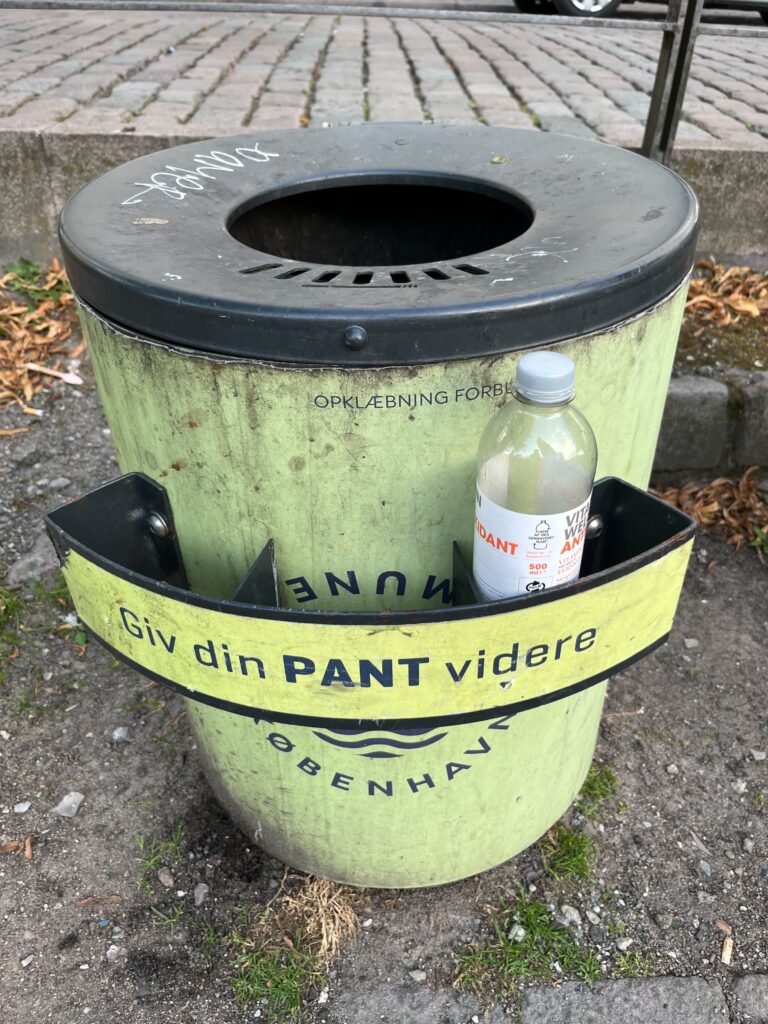
The one-way system works based on the ABC deposit system as various pants and cans can be returned. There are different marks ‘Pant A’, ‘Pant B’, and ‘Pant C’ on bottles and cans which implies that different amounts of money are returned to the customer varying on the type of material used in the bottles and cans, and the volume of each bottle or can.
- Pant A = DKK 1.00 (glass bottles and aluminium cans less than 1 litre)
- Pant B = DKK 1.50 (plastic bottles less than 1 litre)
- Pant C = DKK 3.00 (all bottles and cans of 1–20 litres)
Pant stands in Danish for ‘deposit’ and appears on the label of the bottles or cans in the circle of two arrows. The bottles and cans marked by the Pant logo can be returned either to reverse vending machines which are located in more than 3000 stores throughout Denmark or to ‘pantstation’ {deposit return bank} where the Danes can return up to 90 bottles and cans at a time.
“Denmark has one of the world’s best deposit and return systems for bottles and cans. In an international context, we are unique in being able to collect more than 90 percent of packaging and recycle it for new bottles and cans. The expansion of the deposit system makes sense because it means including more products in a well-functioning closed cycle,” said Lars Krejberg Petersen, Managing Director of Dansk Retursystem for stateofgreen.com.

Poland
CEE country will introduce its Deposit Return System next year in 2023, as it was already postponed for a year once. DRS will include also cans, even if aluminum was not a part of previous plans. The program will be optional for small shops with an area of up to 100 square meters. Polish officials expect a significant reduction in environmental pollution and DRS should even help to get out of the streets also small vodka bottles (known as małpki, or monkeys, in Polish), which remain very popular in Poland.
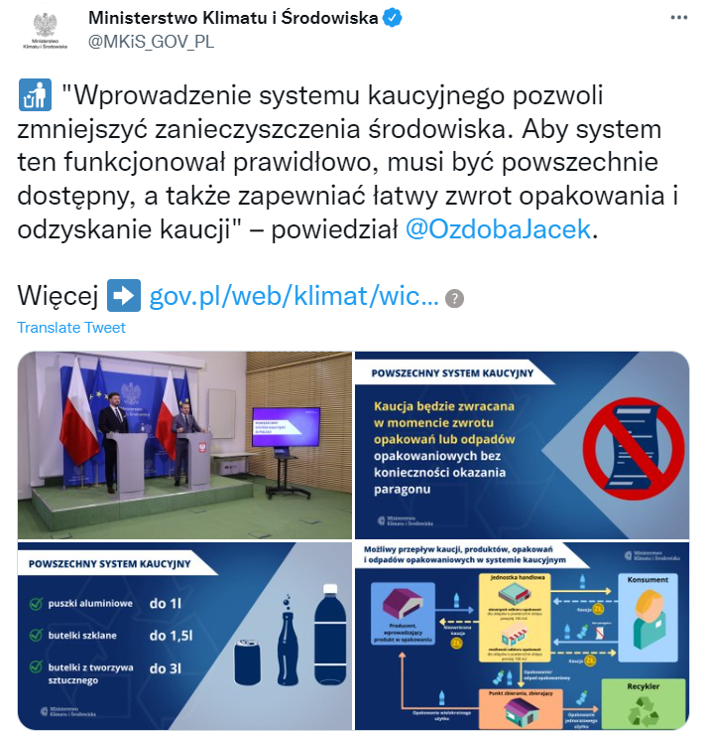
Finland
With a 97% return rate is the Finnish Deposit Return Scheme one of the most successful worldwide. According to PALPA, the national DRS operator, in 2023 Finland reached the return rate for reusable bottles of 97%, all refilled approximately 33 times. Cans and glass bottles reached a return rate of over 98%. DRS in Finland is supported by the beverage packaging tax.
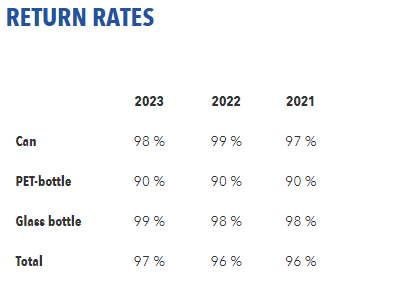
Importers and manufacturers must pay a packaging tax of €0.51 per liter on glass, plastic, or aluminum containers for water, soft drinks, and alcohol. By becoming members of the DRS, manufacturers, and importers are exempt from the beverage packaging tax. Any store that sells packages with a deposit is obliged to take the empty ones. The deposit amount is between 0.10 and 0.40 EUR depending on the type of container.
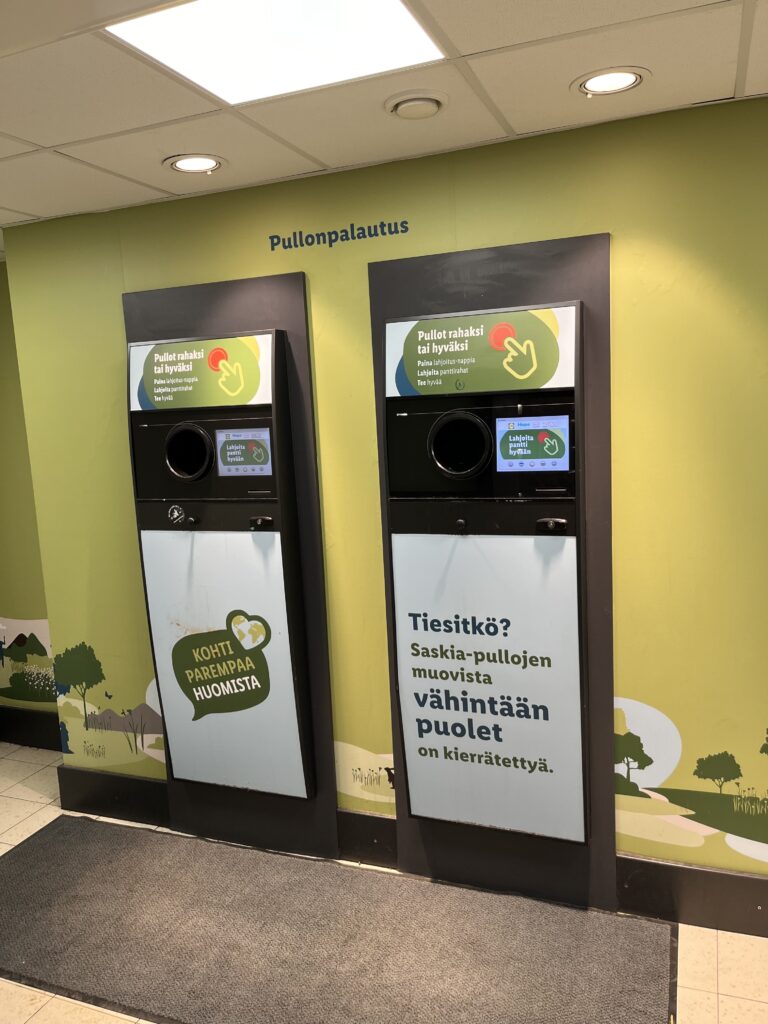
Source of the collection rates:
Denmark, Estonia, Finland, Netherlands, Croatia, Lithuania, Germany, Norway, Sweden (2022)



